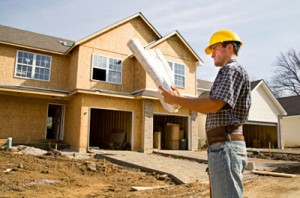Construction Careers Outlook
 Construction accounts for approximately one-tenth of the U.S. annual gross national product. Physical facilities built by the construction industry include homes, stores and buildings, mills and factories, highways and streets, bridges, railroads, airports, wharves and docks, pipelines, tunnels, dams, power plants, irrigation projects, public works, and defense installations.
Construction accounts for approximately one-tenth of the U.S. annual gross national product. Physical facilities built by the construction industry include homes, stores and buildings, mills and factories, highways and streets, bridges, railroads, airports, wharves and docks, pipelines, tunnels, dams, power plants, irrigation projects, public works, and defense installations.
Whether it is the life savings of one family buying a home or the investments of a corporation to finance the erection of a skyscraper, it all adds up to a substantial yearly increase in national investment. The nation’s banks, insurance companies, pension plans, and other financial institutions have a big stake in construction, for they finance most of it.
In the 21st century the nation will be forced to make major repairs to its infrastructure—highways, tunnels, bridges, dams, schools, power plants, water and sewer systems, subways, and airports—which will generate the need for all kinds of people employed in highway and heavy construction work. In addition to the increased numbers of projects, the construction projects themselves will grow in both size and complexity. New laws setting higher standards for building and construction materials, worker safety, energy efficiency, and pollution control will need to be addressed by skilled professionals with expertise in construction science, engineering, and management.
Residential construction should continue to grow, although the demand for remodeling and repair work is likely to be stronger than the demand for new housing. The remodeling trend will also take place in nonresidential construction as aging industrial plants, schools, hospitals, and other large buildings need alteration, expansion, and repair. Employment growth is expected in highway, bridge, and street construction, as well as in repairs to prevent further deterioration of highways and bridges.
Employment of construction managers, who oversee projects and ensure that laws are upheld, is expected to grow as fast as the average through 2014. Managers with a bachelor’s degree in construction science and work experience with a construction management services firm should have plenty of job opportunities.
Job growth also will occur in most of the skilled construction trades, especially for electricians. They will be needed in greater numbers not only to replace old wiring in existing facilities but to keep pace with the continuing growth in telecommunications and computer equipment now used in many new structures, including, for example, electronically operated “smart” buildings.
Employment of tile and marble setters, construction and building inspectors, and heating, air-conditioning mechanics and installers should grow faster than the industry average. Employment of carpet installers, construction laborers, floor sanders and finishers, insulation workers, paperhangers, plasters and stucco masons, and tapers is expected to grow more slowly than the construction industry as a whole because of the development of new materials and equipment that increases productivity with less labor.
All these factors point to a steady expansion of the market for construction services. Although further technological improvements in construction methods and equipment is expected to raise the productivity of workers, the volume of activity will require substantial numbers of craftworkers in the various building trades, mostly as replacements for those who retire or leave the labor force for other reasons.
Although prospects look promising, the construction industry is very sensitive to fluctuations in the national economy. These fluctuations usually affect part-time and seasonal workers and lower-skilled workers the most. Skilled, artistic tradespeople are almost always in demand, even during economic downturns.
Careers in Construction:
- Architects
- Asbestos Abatement Technicians
- Bricklayers and Stonemasons
- Carpenters
- Cement Masons
- Civil Engineering Technicians
- Civil Engineers
- Construction Inspectors
- Construction Laborers
- Cost Estimators
- Drafters
- Drywall Installers and Finishers
- Electricians
- Elevator Installers and Repairers
- Floor Covering Installers
- Glaziers
- Heating and Cooling Technicians
- Ironworkers
- Landscape Architects
- Lathers
- Marble Setters, Tile Setters, and Terrazzo Workers
- Operating Engineers
- Painters and Paperhangers
- Plasterers
- Plumbers and Pipefitters
- Roofers
- Sheet Metal Workers
- Stationary Engineers
- Surveying and Mapping Technicians
- Surveyors
- Welders
- Welding Technicians
